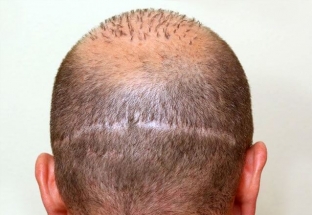Alopecia today is one of the most common problems with which patients seek help from trichologists. There are a huge number of reasons for this condition: genetic predisposition, endocrine pathologies, diseases of the skin and hair follicles, the consequences of taking certain medications, and so on. Conservative therapy can be effective in a certain percentage of cases, but the most effective and radical method of treating the problem is hair transplantation. Such surgery is not uncommon today, but after hair transplantation on the head, side effects may occur, which are described by estet-portal.com.
What side effects can occur after hair transplantation on the head
Side effects after hair transplantation on the head occur in both sexes with varying frequency. In addition, unpleasant consequences can appear both immediately after the operation and at a later date.
The doctor to whom the patient seeks help is obliged to warn him of the possible side effects that may occur after hair transplantation.
10 most common side effects of scalp hair transplant:
1. Hemorrhages
Bleeding or bruising after scalp hair transplantation is one of the most common side effects of this surgery. They usually occur as a result of using the wrong transplant technique, gross manipulations on the scalp, as well as using unsuitable surgical instruments.
2. Infections
Infectious processes after hair transplantation are almost always the result of non-compliance with sanitary standards and rules of asepsis and antisepsis. The use of antibacterial drugs will help prevent the development of such an adverse reaction.
3. Hair loss
This complication occurs as a result of the fact that not all hairs were transplanted correctly during the operation. Insufficient qualifications of the doctor and the use of incorrect techniques can cause such a reaction of the transplanted hair. Also, don't forget about the ever-present possibility of transplant rejection.
4. Skin itch
Another common side effect of scalp hair transplantation. Itching occurs as a result of the formation of a scab on the skin during wound healing. The severity of this symptom varies from slight discomfort to extremely unpleasant sensations that are very disturbing to the patient. Special oils containing medicinal preparations will help to cope with skin itching.
5. Scars
Scars can form as a result of any damage to the skin. To a large extent, this is due to a genetic predisposition to tissue scarring. The possibility of scarring should be taken into account before surgery, planning the transplant in such a way that possible scars are not visible on the patient's head. Modern conservative and surgical methods of treatment help to eliminate already formed scars.

6. Cysts
Cysts after hair transplantation on the head are formed as a result of damage to the hair follicle and the penetration of the transplanted hair into the deeper layers of the skin. In most cases, they are benign, but require mandatory consultation with the attending physician.
7. Swelling
Slight tissue edema – this is normal after any surgery. If the swelling of the scalp is pronounced and extends to the forehead and eyes – the patient should seek medical attention.
8. Bleeding
This is a fairly rare side effect that can occur as a result of excessive pressure on the scalp during or after surgery.
9. Pain
This is usually a fairly rare symptom that accompanies a hair transplant on the head. The pain may be mild and is often temporary. With the course of the postoperative period, the severity of the pain syndrome gradually decreases.
10. Desensitization
Scalp numbness is extremely rare and can occur up to several weeks after transplantation. If after this period the sensitivity has not recovered – the patient should consult a doctor.
Side effects after scalp hair transplantation are often the result of improper surgical technique or poor postoperative care.
Competent planning of surgical intervention, compliance with all recommendations and techniques will help prevent complications and side effects.







Add a comment